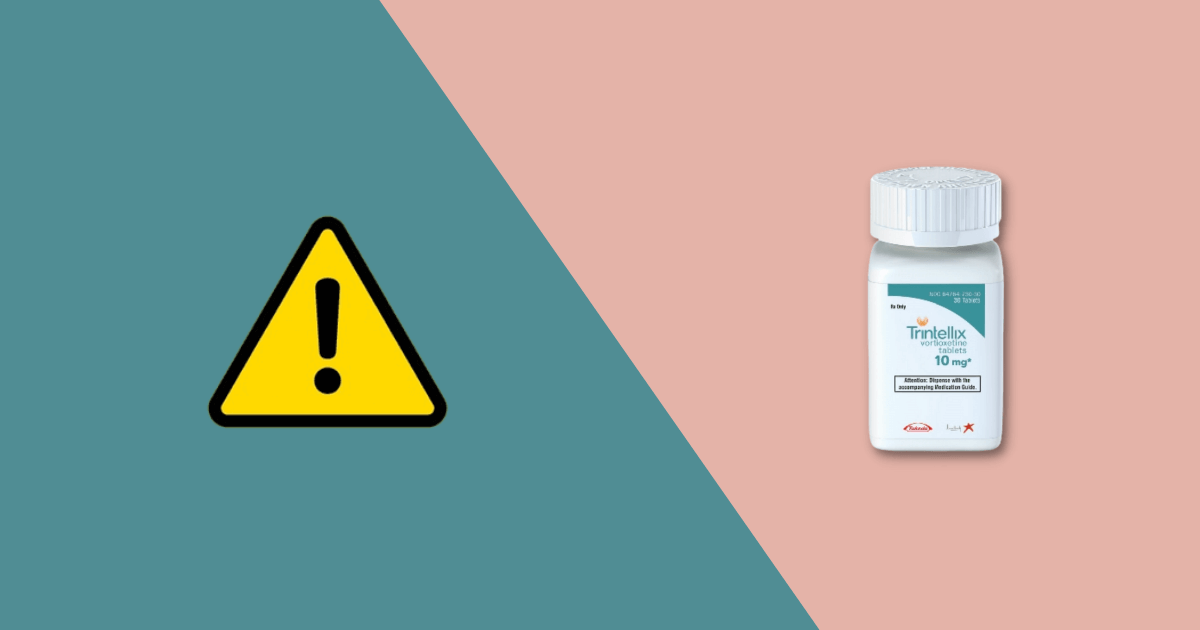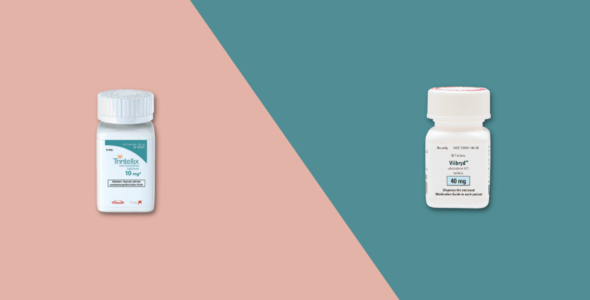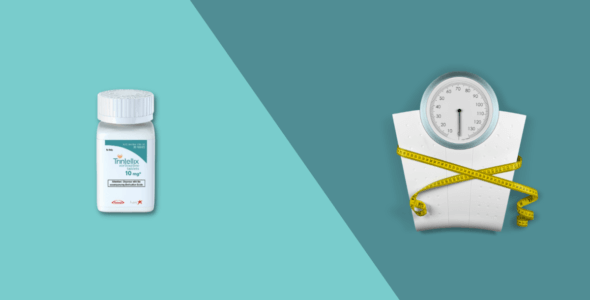Trintellix side effects and how to avoid them
Table of contents
- What is Trintellix?
- Trintellix active ingredients
- Trintellix dosage
- Side effects of Trintellix
- Suicidal thoughts and worsening mental health
- Serotonin syndrome
- Weight gain
- Sexual dysfunction
- Serious bleeding
- Low sodium levels
- Trintellix drug interactions
- Trintellix warnings & precautions
- Pregnancy and Trintellix
- Can you mix Trintellix and alcohol?
- How to avoid Trintellix side effects
Trintellix is a brand-name drug manufactured by Takeda pharmaceuticals. It is a U.S. Food and Drug Administration (FDA) approved prescription medication used to treat depression symptoms in a type of depression known as Major Depressive Disorder (MDD). Trintellix works in a unique way that doesn’t fit neatly into other antidepressant classes but has effects similar to selective serotonin reuptake inhibitors (SSRI). Trintellix is only used to treat major depressive disorder. It is not used for the treatment of anxiety, attention deficit hyperactivity disorder (ADHD), obsessive-compulsive disorder (OCD), or bipolar disorder.
Trintellix can cause adverse effects like any other drug. Learn more about Trintellix side effects that often lead to discontinuation of treatment and how to avoid them.
What is Trintellix?
Trintellix is an antidepressant prescribed to adults to treat Major depressive disorder (MDD). If you have MDD, your doctor may prescribe Trintellix to you, in addition to recommending other treatments. Trintellix works by increasing levels of a natural substance that regulates your brain activity called serotonin. This can reduce the severity of depressive episodes and help keep them at bay. You take Trintellix as an oral tablet that you swallow.
Trintellix active ingredients
The active ingredient in Trintellix is called vortioxetine. It’s a type of antidepressant called a selective serotonin reuptake inhibitor (SSRI). When you swallow a Trintellix tablet, it releases vortioxetine into your bloodstream. Vortioxetine is then carried in your blood to your brain, where it slows down how quickly your brain cells reabsorb a substance called serotonin.
Serotonin is a neurotransmitter that helps regulate your brain function, particularly areas of your brain involved in mood, learning, and memory. Your brain cells reabsorb excess serotonin, but vortioxetine slows down how quickly this happens, causing serotonin levels to rise. This can rebalance your serotonin levels. Research has shown this can help to reduce the symptoms of depression.
The body uses serotonin in many different ways: to regulate mood, control bowel movements, control nausea, and regulate sleeping and waking, and is also involved in blood clotting, bone health, and mental health. This neurotransmitter plays an important role in the body.
Trintellix dosage
Trintellix is available in three different strength immediate-release, film-coated tablets:
- 5 mg
- 10 mg
- 20 mg
Your doctor will advise you on your dosing regime. Each individual will be different and the dose will change from person to person. Some patients may begin with the 5 mg dose, others may take the higher dose. Always follow your doctor’s instructions and seek medical advice if you are unsure about dosing. The medication guide for Trintellix will be provided by your pharmacist before you start taking Trintellix.
Never stop your medication abruptly without consulting your doctor as withdrawal symptoms are possible. In clinical trials, some patients experienced discontinuation symptoms such as headache, muscle tension, mood swings, sudden outbursts of anger, dizziness, and a runny nose. This may occur in the first week of sudden discontinuation of Trintellix 15 mg daily or 20 mg daily.
Get your medication for only $49 per month
Get StartedSide effects of Trintellix
The most common side effects are:
- Nausea (feeling sick)
- Vomiting (being sick)
- Constipation
Sometimes, Trintellix can cause more serious side effects. These include:
- Severe allergic reactions to the medication
- An increased risk of suicidal thoughts and suicide, particularly in young adults
- Serotonin syndrome – a potentially life-threatening condition caused by high levels of serotonin
- An increased risk of bruising and bleeding, especially if taken with medications that can reduce blood clotting, like blood thinners, aspirin, or NSAIDs like ibuprofen
- An increased risk of developing eye problems, including eye pain, swelling, and changes in vision
- An increased risk of hypomania (manic episodes)
- Hyponatremia – low sodium levels in your blood that can cause serious health problems and death
Suicidal thoughts and worsening mental health
Trintellix carries a boxed warning due to the risk for suicidal thoughts and actions. In studies, Trintellix was shown to increase suicidal thoughts and actions in some people 24 years of age and younger. Trintellix is not approved for use in pediatric patients.
A boxed warning is the strongest warning that the FDA requires. These warnings alert doctors and patients about drug effects that may be dangerous.
Serotonin syndrome
Serotonin syndrome occurs when serotonin levels in the body are dangerously high. This can happen when Trintellix is taken alone or with other antidepressants such as sertraline, citalopram, paroxetine, fluoxetine and escitalopram, attention deficit hyperactivity disorder drugs, St. John’s wort, and others.
Symptoms of serotonin syndrome can include:
- High blood pressure
- Confusion
- Increased heartbeat
- Agitation
- Muscle rigidity
- Diarrhea
Weight gain
Trintellix did not significantly impact weight in short-term studies and during a 6-month phase of a long-term study of patients who responded to Trintellix when compared to patients taking a sugar pill. Some reports of weight gain have been received since product approval.
Sexual dysfunction
Like other serotonergic antidepressants, Trintellix may cause sexual side effects during treatment. In 6 to 8-week clinical studies the overall incidence in sexual dysfunction was as follows: in male patients the overall incidence was 3%, 4%, 4%, 5% in Trintellix 5mg/day, 10 mg/day, 15 mg/day, 20 mg/day, respectively, compared to 2% in placebo. In female patients, the overall incidence was <1%, 1%, <1%, 2% in Trintellix 5 mg/day, 10 mg/day, 15 mg/day, 20 mg/day, respectively, compared to <1% in placebo. These results were from voluntary reports of sexual side effects of antidepressants which are known to be underreported in part because patients may be reluctant to discuss them.
When patients were proactively assessed using a self-rated questionnaire called the Arizona Sexual Experiences Scale (ASEX) different results were observed. This was designed to identify Treatment-Emergent Sexual Dysfunction used in seven Trintellix clinical trials to determine how many people actually experienced sexual side effects. The ASEX scale included five questions to obtain information on sex drive, ease of arousal, ability to achieve an erection (men) or lubrication (women), ease of reaching orgasm, and orgasm satisfaction.
The results showed that sexual dysfunction occurred in 34% of females and 16% to 29% of males and 22% who took Trintellix during the clinical studies. They were more likely to happen when higher doses of the drug were taken.
Male sexual dysfunction symptoms include:
- Ejaculation delay or failure
- Decreased libido
- Erectile dysfunction symptoms may be seen
Female sexual dysfunction symptoms:
- Decreased libido
- Delayed orgasm
- Absence of orgasm
Talk to your healthcare provider if you develop any changes in your sexual function or if you have any questions or concerns about sexual problems during treatment. Other alternatives are available.
Serious bleeding
When Trintellix is used with other medications that increase the risk of bleeding such as nonsteroidal anti-inflammatory drugs (NSAIDs), aspirin, or warfarin there is a serious bleeding risk. Nose bleeds, bleeding in the stomach or bleeding in the brain have the potential to occur.
Symptoms of serious bleeding can include:
- Uncontrollable bleeding
- Urine turning red, pink, or brown
- Tarry stools red or black in color
- Coughing up blood
- Vomit that looks like coffee grounds
Low sodium levels
Certain people and people older than 65 years of age, or those taking a diuretic medication, are more likely to have this side effect. Trintellix can cause low sodium levels.
Symptoms of low sodium can include:
- Trouble concentrating
- Headache
- Confusion
- Weakness
Trintellix drug interactions
Trintellix can interact with other medications, including:
- Monoamine oxidase inhibitors (MAOI) medications such as linezolid, methylene blue, isocarboxazid, phenelzine, and tranylcypromine
- Strong CYP2D6 inhibitors such as Cardioquin (quinidine), Prozac (fluoxetine), Paxil (paroxetine), and bupropion (Wellbutrin). Your doctor may decrease your dose of Trintellix.
- Strong CYP inducers, such as Dilantin (phenytoin) Rifadin or Rimactane (rifampin), Tegretol, or Epitol (carbamazepine). Your doctor may increase your dose of Trintellix.
- Tricyclic antidepressants such as lithium
- Any selective serotonin reuptake inhibitor (SSRI) antidepressant such as sertraline (Zoloft), citalopram (Celexa), paroxetine, fluoxetine, and escitalopram (Lexapro)
- Any serotonin-norepinephrine reuptake inhibitor (SNRI) antidepressant such as duloxetine and venlafaxine (Effexor)
- Any other medications taken to treat major depressive disorder
- Any other medications that can affect your serotonin levels
- Buspirone, taken most often to treat anxiety disorders
- Any antipsychotic medications
- Opioid painkillers, like tramadol or fentanyl
- Nonsteroidal anti-inflammatory drugs (NSAIDs), like ibuprofen or naproxen
- Triptans used for migraines
- Aspirin
- Warfarin, an anticoagulant (blood thinner) taken to reduce the risk of blood clots
- A herbal supplement called St. John’s Wort
Trintellix warnings & precautions
Antidepressants can increase the risk of suicidal thoughts and suicide in children and young adults, particularly during the first few months of treatment. Trintellix is not for use in children, but young adults taking it should be monitored for signs of sudden changes in behavior, mood, thoughts, or feelings. Seek urgent medical attention if you, or someone you care for, feels they are at risk of suicide.
Don’t take Trintellix if you:
- Are allergic to the active ingredient vortioxetine, or any of the other ingredients in Trintellix
- Are currently taking a monoamine oxidase inhibitor (MAOI) antidepressant or have taken one in the last 14 days
- Are under 18 years of age
Talk to your doctor before taking Trintellix if you:
- Have bipolar disorder or mania
- Have any liver problems
- Have a personal or family history of angle-closure glaucoma
- Have or have ever had seizures/convulsions
- Have or have ever had any problems with bleeding
- Have low salt (sodium) levels in your blood
- Regularly drink alcohol
- Are pregnant or are planning to become pregnant
- Are breastfeeding or are planning to breastfeed
Pregnancy and Trintellix
Your doctor may weigh the risks and benefits when prescribing Trintellix during pregnancy. Using Trintellix during the third trimester of pregnancy can increase the risk for persistent high blood pressure in the pulmonary artery and withdrawal in the newborn.
If you are pregnant or plan on becoming pregnant, it is best to speak with your healthcare provider before starting a medication.
Breastfeeding
Talk to your healthcare provider if you are breastfeeding or planning to breastfeed. It is unknown if this drug passes into breast milk.
Can you mix Trintellix and alcohol?
Trintellix’s prescribing information does not list alcohol as a contraindication or warning but is strongly discouraged by healthcare professionals. Trintellix can worsen the effects of alcohol, while alcohol can worsen the side effects of Trintellix. When you have depression, you have an increased risk of developing a substance use disorder. Therefore mixing antidepressants with alcohol can lead to alcohol abuse, increasing the potential to become alcohol dependent. If you drink and develop an addiction to alcohol, it will become more difficult for you to control your symptoms of depression and get your alcohol consumption under control. You may need more frequent and long-term treatment if you have both an alcohol use disorder and depression.
The combination of alcohol and antidepressants can be very challenging if someone is drinking, binge drinking, heavy drinking, or has an alcohol use disorder prior to taking antidepressants. Furthermore, if someone decides to stop taking drugs for depression and starts drinking alcohol for symptom management instead, they can worsen their symptoms of depression, in some cases leading to suicidal thoughts.
How to avoid Trintellix side effects
1. Stick to the recommended dosage
Take your prescribed dose that has been recommended by your healthcare professional once daily at the same time each day with water. Taking your medication consistently will make a big difference in how well Trintellix works for you.
Your healthcare provider may adjust your dose of Trintellix or your other medications to find the best dosage for your specific needs.
2. Discuss medical history
Discussing your medical history with your healthcare provider is important to help them understand how well Trintellix will work for you. Give a complete list of all the prescription drugs, including over-the-counter meds, supplements especially St. John’s wort and tryptophan, and health conditions you may have. Talking with your doctor will allow them to pick up any drug interactions with Trintellix and help manage any possible side effects.
3. Reduce alcohol intake
Although alcohol doesn’t interact directly with Trintellix, mixing Trintellix and alcohol together is strongly discouraged by healthcare professionals. Both work on slowing down the central nervous system causing drowsiness, sedation, and impairment. When taken together however they can create health problems for you, impact your mental health further, cause challenges in your home life with loved ones, and other serious concerns.
If you are planning to drink alcohol and you have Major depressive disorder, aim to always stay within the recommended guidelines. This is the safest way to drink alcohol.
4. Pay attention to your body
Paying attention to how your body feels when taking Trintellix is important. If you or loved ones around you see new or sudden changes in your mood, behavior, thoughts or feelings, or symptoms that are new or worsening, or if you develop suicidal thoughts or actions get emergency help right away.
Talk to your doctor straight away if you start to experience any side effects of Trintellix when taking it, or if you feel the medication is not working for you. There are many other treatment options available.
5. Try to stay healthy
Managing depression with drugs is one way to keep symptoms under control. Another way to keep yourself mentally healthy is to:
- Explore your interests
- Taking regular exercise
- Eating healthy
- Getting enough sleep
- Keeping hydrated
5. Store Trintellix correctly
Store the medicine in a closed container at room temperature, away from heat, moisture, and direct light. Do not store it in the bathroom.
Knowing how to store your medication is important to make sure it remains as effective as possible. Using expired or improperly stored medication could result in the medication not working properly and even causing unwanted side effects.
Medically reviewed
A medical professional has reviewed this article.


Jamie Winn, PharmD
Jamie Winn, PharmD
Dr. Jamie Winn received his Doctor of Pharmacy in 2002 from the University of South Carolina College of Pharmacy, Columbia, SC. Jamie is a medical reviewer for NiceRx.





